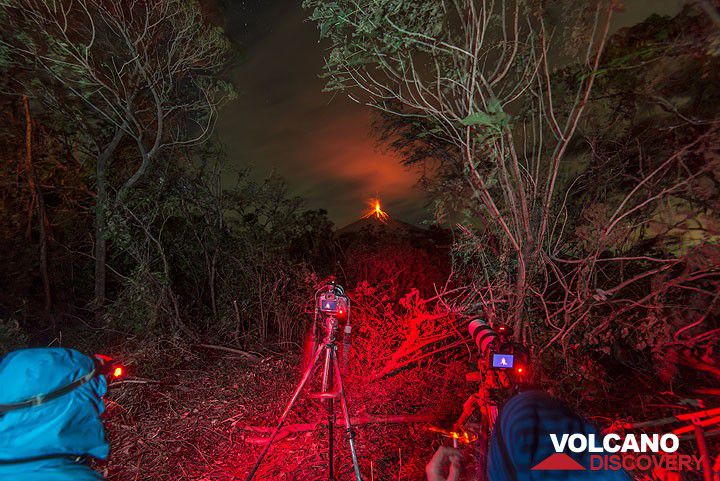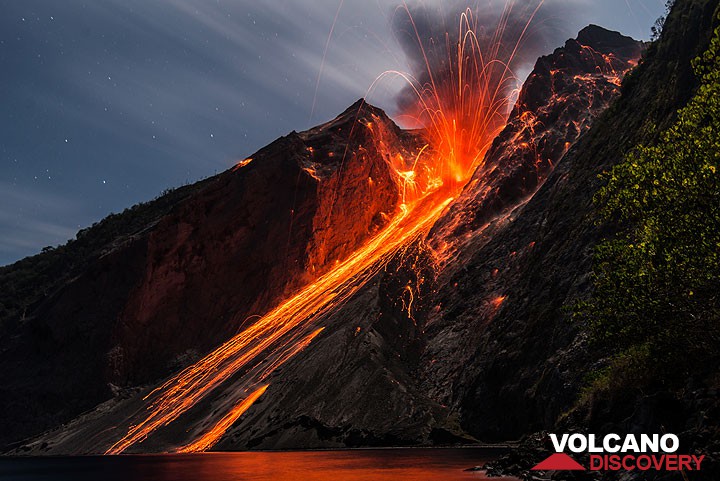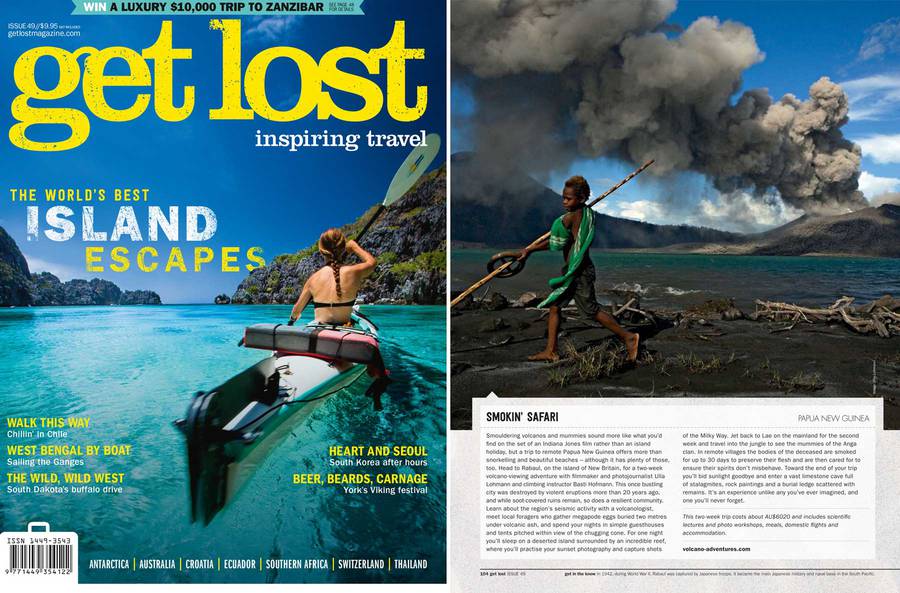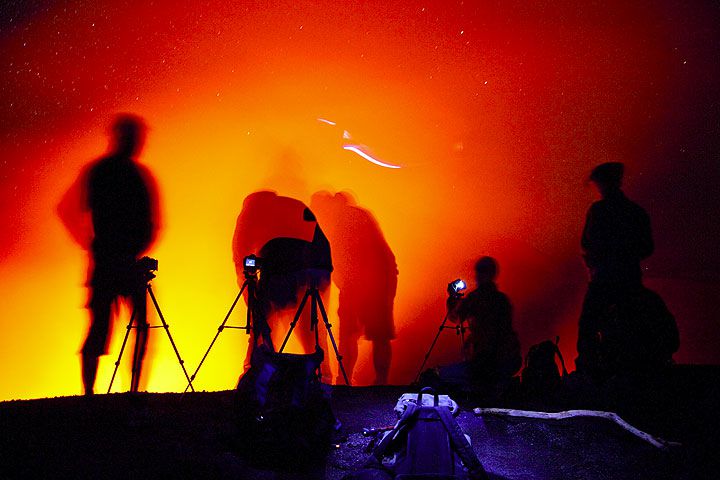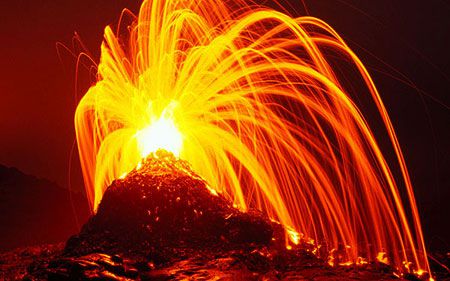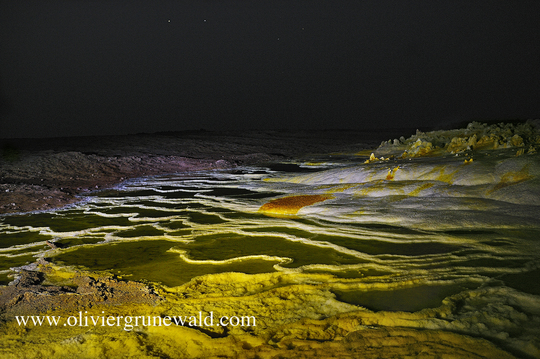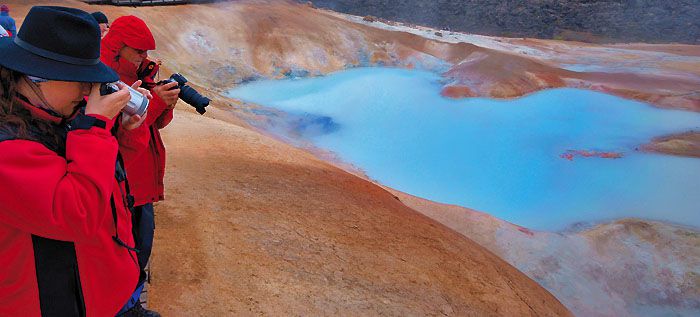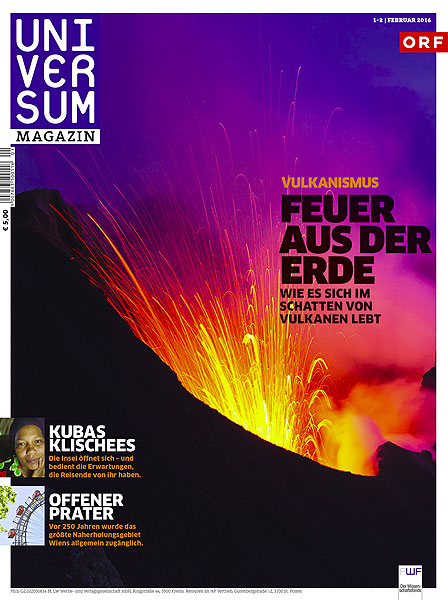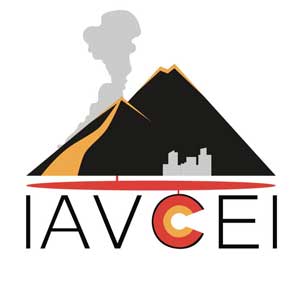Erta Ale lava lake - is it currently safe to travel to Ethiopia?
Wed, 26 Oct 2016, 21:44 | BY: INGRID
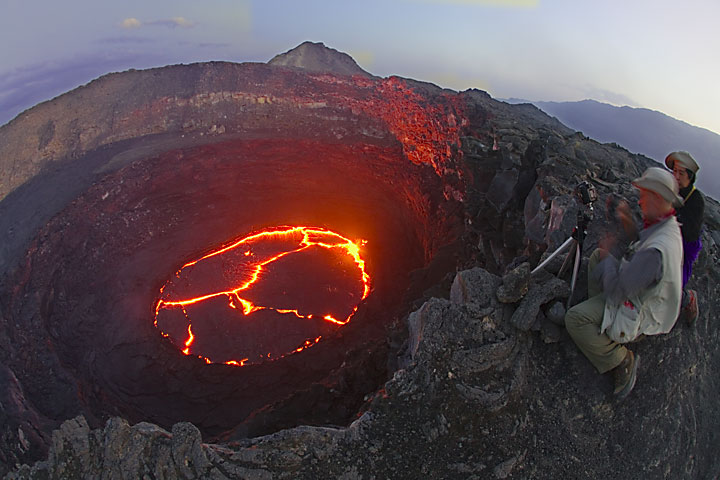
Observing Erta Ale´s active lava lake in February 2008
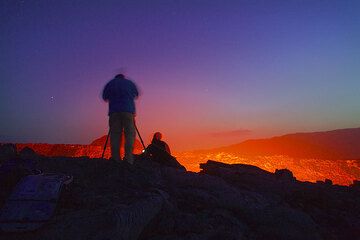
Silhouette of photographer at the rim of the lava lake

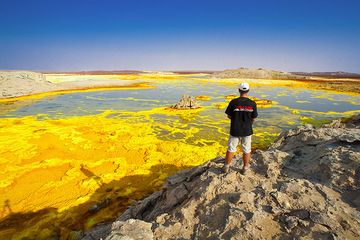
A lava bubble bursts through the lakes thin silvery crust
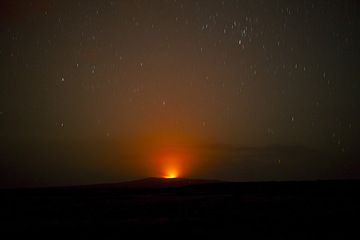
Vibrant green and yellow at Dallol in December 2010
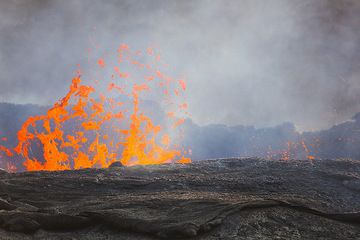
The intense nighttime glow already observable from the base camp in November 2010 promised a very active lava lake on arrival...
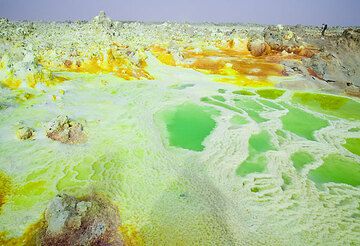
Lava spattering over the crater rim which can hardly contain the active lake in November 2010
Ethiopia´s upcoming winter also signals the return of adventure travelers to the otherwise too hot Danakil dessert and its Erta Ale lava lake, colourful Dallol geothermal system and large salt lakes.
Many of our customers are thereby understandably worried about the current political situation in Ethiopia, where after almost one year of protests the government declared the state of emergency on October 8. So what are these protests and political instability about? Is it still safe to travel to certain parts of Ethiopia, or should one currently avoid all travel throughout this vast country?
Root of the current unrest is the multi-cultural composition of the almost 100 million Ethiopians which together comprise about 80 ethnic groups each with their own language, culture and traditions.During Ethiopia´s long and rich history, this large variety of ethnic groups was mostly ruled as a kingdom or other form of authoritarian regime where a central government exerted power over the country and its people. The four largest ethnic groups are the Oromo (34,4%), the Amhara (27,0%), the Somali (6,22%) and the Tigray (6,08%). Since the 19th century it were mainly the Amhara who had the power of government and ruled Ethiopia, thereby being the only African state who successfully withstood attempts of colonisation by European states. A short period of a communist regime came to end in the 1990s and following the first multi-party elections Ethiopia has since been governed mainly by the Tigray.
Over the past 25 years, Ethiopia has known a large economic growth and development boost under this current Tigray government which however does not fully uphold the principles of democracy and human rights. They did organise and oversee many improvements of the national road system, the railways, the telecommunication network, mining, ... which were mostly financed by international companies from China. And given the country´s rich history and very diversified fauna and flora, tourism also picked up immensely in the past decade(s) - so much that Ethiopia was one of 2015 top travel destinations worldwide.
However, this government led / induced modernisation and development of the country also means that there were plans in 2015 to take some of the Oromo land around Addis Ababa to allow further expansion of the country´s capital. The Oromo people therefore started to protest to this (further) grabbing of their land in November 2015, and although these plans have since been retracted by the government, protests have not died out. Being the largest ethnic group in Ethiopia, the Oromo had a political tradition of democracy before they came under the regime of the old Ethiopian kingdom, and they want the current mainly Tigray and authoritarian government to step down and introduce /restore a democracy.Protest actions have been carried out for almost a year now, also by individual Olympic athletes this summer, and in the mean time the Amhara (second largest ethnic group) seem to have joined ranks with the Oromo protesters. There have been incidents where the local law enforcement shot at the mass of protesters, or that protesters got killed due to a stampede that followed counter measures from the law enforcement. Media have been restricted and journalists have been imprisoned for anti-government reporting.
At the moment, the central government still has power throughout Ethiopia. The German cancellor Angela Merkel visited the capital on October 11 and urged the Ethiopian government to open up their politics as she offered diplomatic help between the government and the protesters, not hiding her support to the latter. How this situation will evolve, no one can tell - it can be anything between a peaceful solution and a civil war. The latter is however less likely to happen now that Ethiopia has been more intimately involved in international politics and that so many outside international companies have been investing so much in this beautiful country.
Looking at the present travel advice from European governments, the only change is that they advise against any unnecessary travel in the Oromo and Amhara regions and that one should just be extra watchful when traveling to other areas and the capital, Addis Ababa. The Afar region where the largest part of our Danakil expedition takes place, has for decades been a ´do not travel there´ area with regards to international travel advice, due to the ongoing Ethiopian-Erithrean conflict. Since the deadly assault on travelers on Erta Ale´s caldera rim on 17 January 2012, the government did take many measures to ensure travelers´ safety and a better cooperation with the local Afar people. Together with asphaltation of the main road and construction of new roads, this led to an exponential increase of travelers and tourists visiting the Danakil in the past 5 years.
We are constantly communicating with our colleagues in Addis Ababa with whom we organise our Danakil expeditions. They informed us that last week´s cultural tours in the northern part of Ethiopia (where the protests are) went as smoothly as usual and that the state of emergency seems to have eased the situation and increased the overall safety in the country. The government is furthermore actively discussing with the protesters and trying to find an agreement with them instead of having the situation further escalate. Earlier this month there have also been official statements from the Ethiopian Tourism Organisation (ETO) to both domestic and international travel organisers explaining that the short state of emergency in no way affects the daily lives of Ethiopian citizens nor forms a safety issue for visitors planning to travel to Ethiopia for business or holidays.
Hence, regarding the specific travel itinerary of our 14 day Danakil expedition, we do not believe that there is any increased risk due to the political unrest in the country. We will, off course, keep following the situation closely and if we think that it is no longer safe to travel to Addis Ababa, or into the Danakil, or to Mekele, we will not hesitate to cancel any of our upcoming guaranteed Danakil expeditions and thereby fully refund the money paid to Volcano-Adventures.
Many of our customers are thereby understandably worried about the current political situation in Ethiopia, where after almost one year of protests the government declared the state of emergency on October 8. So what are these protests and political instability about? Is it still safe to travel to certain parts of Ethiopia, or should one currently avoid all travel throughout this vast country?
Root of the current unrest is the multi-cultural composition of the almost 100 million Ethiopians which together comprise about 80 ethnic groups each with their own language, culture and traditions.During Ethiopia´s long and rich history, this large variety of ethnic groups was mostly ruled as a kingdom or other form of authoritarian regime where a central government exerted power over the country and its people. The four largest ethnic groups are the Oromo (34,4%), the Amhara (27,0%), the Somali (6,22%) and the Tigray (6,08%). Since the 19th century it were mainly the Amhara who had the power of government and ruled Ethiopia, thereby being the only African state who successfully withstood attempts of colonisation by European states. A short period of a communist regime came to end in the 1990s and following the first multi-party elections Ethiopia has since been governed mainly by the Tigray.
Over the past 25 years, Ethiopia has known a large economic growth and development boost under this current Tigray government which however does not fully uphold the principles of democracy and human rights. They did organise and oversee many improvements of the national road system, the railways, the telecommunication network, mining, ... which were mostly financed by international companies from China. And given the country´s rich history and very diversified fauna and flora, tourism also picked up immensely in the past decade(s) - so much that Ethiopia was one of 2015 top travel destinations worldwide.
However, this government led / induced modernisation and development of the country also means that there were plans in 2015 to take some of the Oromo land around Addis Ababa to allow further expansion of the country´s capital. The Oromo people therefore started to protest to this (further) grabbing of their land in November 2015, and although these plans have since been retracted by the government, protests have not died out. Being the largest ethnic group in Ethiopia, the Oromo had a political tradition of democracy before they came under the regime of the old Ethiopian kingdom, and they want the current mainly Tigray and authoritarian government to step down and introduce /restore a democracy.Protest actions have been carried out for almost a year now, also by individual Olympic athletes this summer, and in the mean time the Amhara (second largest ethnic group) seem to have joined ranks with the Oromo protesters. There have been incidents where the local law enforcement shot at the mass of protesters, or that protesters got killed due to a stampede that followed counter measures from the law enforcement. Media have been restricted and journalists have been imprisoned for anti-government reporting.
At the moment, the central government still has power throughout Ethiopia. The German cancellor Angela Merkel visited the capital on October 11 and urged the Ethiopian government to open up their politics as she offered diplomatic help between the government and the protesters, not hiding her support to the latter. How this situation will evolve, no one can tell - it can be anything between a peaceful solution and a civil war. The latter is however less likely to happen now that Ethiopia has been more intimately involved in international politics and that so many outside international companies have been investing so much in this beautiful country.
Looking at the present travel advice from European governments, the only change is that they advise against any unnecessary travel in the Oromo and Amhara regions and that one should just be extra watchful when traveling to other areas and the capital, Addis Ababa. The Afar region where the largest part of our Danakil expedition takes place, has for decades been a ´do not travel there´ area with regards to international travel advice, due to the ongoing Ethiopian-Erithrean conflict. Since the deadly assault on travelers on Erta Ale´s caldera rim on 17 January 2012, the government did take many measures to ensure travelers´ safety and a better cooperation with the local Afar people. Together with asphaltation of the main road and construction of new roads, this led to an exponential increase of travelers and tourists visiting the Danakil in the past 5 years.
We are constantly communicating with our colleagues in Addis Ababa with whom we organise our Danakil expeditions. They informed us that last week´s cultural tours in the northern part of Ethiopia (where the protests are) went as smoothly as usual and that the state of emergency seems to have eased the situation and increased the overall safety in the country. The government is furthermore actively discussing with the protesters and trying to find an agreement with them instead of having the situation further escalate. Earlier this month there have also been official statements from the Ethiopian Tourism Organisation (ETO) to both domestic and international travel organisers explaining that the short state of emergency in no way affects the daily lives of Ethiopian citizens nor forms a safety issue for visitors planning to travel to Ethiopia for business or holidays.
Hence, regarding the specific travel itinerary of our 14 day Danakil expedition, we do not believe that there is any increased risk due to the political unrest in the country. We will, off course, keep following the situation closely and if we think that it is no longer safe to travel to Addis Ababa, or into the Danakil, or to Mekele, we will not hesitate to cancel any of our upcoming guaranteed Danakil expeditions and thereby fully refund the money paid to Volcano-Adventures.
Previous news
02 / 09 / 2016
Pilot tours - exploring new destinations with us
We sometimes offer tours to new destinations or with new itineraries that we haven't tried before. Careful preparation can never substitute a real test... Such trips are your chance to join us on such trips offered at reduced cost, but with sometimes only minimal detail information available.Read all
Show more


